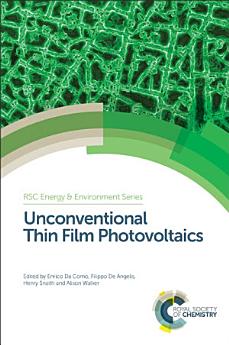Unconventional Thin Film Photovoltaics
Acerca de este libro electrónico
Acerca del autor
Enrico Da Como is a Reader in the Department of Physics, University of Bath, UK. His research deals with the interaction of light with condensed matter.
Filippo De Angelis is Senior Researcher and Deputy Director at the CNR Institute of Molecular Sciences and Technologies, Italy. His research interests are mainly focussed on the computational modeling of hybrid/organic photovoltaics.
Henry Snaith is a Professor in the Department of Physics, University of Oxford, UK. His research focusses on developing the physics and technology behind low cost photovoltaic concepts.
Alison Walker is a Professor in the Department of Physics, University of Bath, UK. Her research covers the materials and physics of organic, inorganic and hybrid semiconductor devices.







